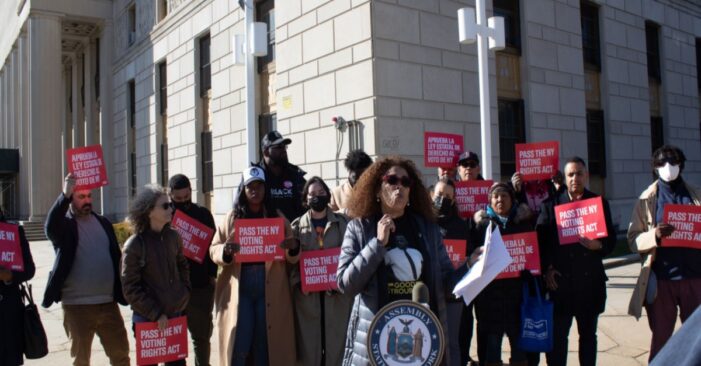Bronx, New York, United States – April 28, 2022: Assemblywoman Yudelka Tapia of district 86 leads the New York Voting Rights Bronx Rally in the steps of the Bronx Borough Hall. (Shutterstock)
By Civil Rights
On June 25, 2013, five justices of the U.S. Supreme Court gutted a key provision of the Voting Rights Act (VRA) in the Shelby County v. Holder decision. That afternoon, the late Congressman John Lewis — who risked his life fighting for voting access and nearly died on Bloody Sunday in Selma, Alabama — wrote that “the Supreme Court stuck a dagger into the heart of the Voting Rights Act of 1965.”
Before the ink was dry on the Shelby County decision, then-Texas Attorney General Greg Abbott tweeted that the state’s strict voter ID law should go into effect immediately. Within 24 hours, Alabama announced it would finally start enforcing the photo ID law it had passed two years earlier. And weeks later, North Carolina Governor Pat McCrory signed a monster anti-voter law (H.B. 589) that the U.S. Court of Appeals for the Fourth Circuit later said was enacted to “target African Americans with almost surgical precision” in violation of Section 2 of the VRA and the Fourteenth and Fifteenth Amendments. We previously highlighted the stories of several Black voters in North Carolina who were disenfranchised because of this law.
The immediate injury caused by the Supreme Court’s dagger into the heart of the VRA has not been healed in the nine years since Shelby County. It’s only grown worse. Alabama, North Carolina, and Texas were swift and intentional in their actions to disenfranchise voters of color. But since 2013, countless states and localities have used anti-voter legislation and racist conspiracy theories to increase their power at the expense of historically marginalized communities.
Attacks on the freedom to vote have been relentless, have come in many forms, and have impacted voters from diverse and intersecting backgrounds — including voters of color, Native American voters, young voters, voters with disabilities, and voters who require language assistance. And because voting rights protect all other rights, this hasn’t stopped at access to the ballot.
Nine years after Shelby County unleashed states to bar citizens from the ballot, especially people of color, the Supreme Court last month gave state legislatures the full power to decide reproductive rights. This is connected. It’s no coincidence that Dobbs v. Jackson Women’s Health Organization, the Supreme Court decision that overturned Roe v. Wade, originated in Mississippi. Mississippi has the highest percentage of Black residents in the nation, yet modern-day efforts to disenfranchise Black voters and other marginalized communities in the state have led to a state legislature that is dramatically out of step with the will of the people.
In the wake of Shelby County, the absence of Section 5 of the VRA made it increasingly difficult to identify harmful voting changes before they took effect because states and localities were no longer required to seek preclearance from federal officials of changes to voting laws. This has included the closure of polling places — a common and particularly pernicious way to disenfranchise voters of color. Closing polling places has a cascading effect, leading to long lines at other polling places, transportation hurdles, denial of language assistance and other forms of in-person help, and mass confusion about where eligible voters may cast their ballot. For many people, and particularly for voters of color, older voters, rural voters, and voters with disabilities, these burdens can make it more difficult — and sometimes impossible — to vote.
The Leadership Conference Education Fund (our sister organization) released a report in 2019 highlighting how the Shelby County decision paved the way for systematic statewide efforts to reduce the number of polling places. The analysis uncovered 1,688 polling place closures between 2012 and 2018 in jurisdictions formerly covered by Section 5 and revealed statewide efforts to reduce polling places across Texas, Arizona, and Georgia — all states with rapidly growing and diversifying electorates. Each state stood out for the volume, scale, and breadth of its polling place closures. Indeed, the 10 counties that closed the most polling places by number were all located in those three states.
Our sister organization’s 2019 #DemocracyDiverted report found that – between 2012 and 2018 – 1,688 polling places were closed in jurisdictions that were formerly covered by Section 5 of the Voting Rights Act: https://t.co/uCeE4QuOSf
Congress must work to #RestoreTheVRA. pic.twitter.com/cNdH08TEGZ
— The Leadership Conference (@civilrightsorg) June 11, 2021
It wasn’t just poll closures. Freed from federal oversight, local jurisdictions quickly enacted an array of discriminatory voting changes. For example, the City of Pasadena — once the Texas headquarters of the Ku Klux Klan — immediately changed its method of electing city council members in order to diminish the voting power of a growing Latino community. The city converted two single-member districts to at-large districts, producing one less Latino-majority single-member district than under the previous plan. A court found Pasadena’s plan intentionally diluted Latino voting strength, blocked its implementation, and ordered the city to preclear future changes by the Department of Justice (DOJ) until 2023.
In 2015 in Alabama, where photo ID was required to vote post-Shelby, the governor and a state agency closed 31 driver’s license offices — many in majority Black counties in the Black Belt region. The U.S. Department of Transportation opened a civil rights investigation under Title VI of the Civil Rights Act of 1964 and concluded that the closures had a disparate impact on Black Alabamians in violation of federal law.
When Congress wrote and passed the VRA, lawmakers understood that racial discrimination in voting morphs and changes over time — hence, the creation of Section 5. The tactics now used to restrict electoral participation, like those in Pasadena, in Georgia, and across the nation, are just as pernicious as the poll taxes and literacy tests of the 20th century. And they’re showing no signs of slowing down.
Last year, we commissioned reports on current voting discrimination in 13 states across the country. The reports were written by voting rights experts at civil rights organizations with the help of pro bono law firms and local organizations working with communities of color. The reports — which document this ongoing and recent discrimination at the ballot box against Black, Brown, Asian, and Native voters — were submitted to the official congressional record as part of the legislative efforts to restore the Voting Rights Act.
But no conversation about modern-day voting discrimination is complete without acknowledging the former president’s Big Lie, which has fueled dozens of restrictive voting laws post-2020 presidential election. According to the Brennan Center for Justice, 18 states have passed 34 anti-voter laws since the beginning of 2021, which can disproportionately affect voters of color. Lawmakers in 39 states have considered at least 393 restrictive bills for the 2022 legislative session as of the end of May 2022.
These anti-voter efforts — including sweeping laws in states like Arizona, Florida, Georgia, and Texas — roll back early voting, restrict mail-in voting, add new hurdles for voter registration, impose harsh voter identification requirements, require proof of citizenship, increase barriers for voters with disabilities, strip power from state and local election officials, and allow partisan actors to interfere with election processes or even reject election results entirely.
There is also an alarming rise in attacks on election officials — from front-line poll workers to vote counters to secretaries of state — which threatens the operation and functioning of our democracy. One recent study found that half of election officials are concerned about safety and nearly one in three know of a colleague who has quit partly due to safety concerns, increased threats, or intimidation.
And for the first time since 1965, electoral maps are being designed without the full protections of the VRA. Legislators are drawing and adopting brazenly partisan and racially discriminatory plans to accomplish political gain at the expense of voters of color. For example, although 95 percent of the growth in Texas’ population in the past decade was attributable to people of color, the Texas legislature redrew federal and state legislative districts to increase the influence of White voters and diminish the voting strength of communities of color.
More than nine years ago, SCOTUS’s Shelby County decision effectively opened the floodgates to racial discrimination in voting with an intensity that has continued to this day.
Voting rights are the cornerstone of ALL fundamental rights. Let’s fight back: https://t.co/1zBf19ye6Q pic.twitter.com/nBz8AaqqVS
— The Leadership Conference (@civilrightsorg) July 8, 2022
The wave of anti-voter restrictions since Shelby County suggests that restoring the VRA and erecting additional safeguards to protect voters from discrimination must be a top legislative priority. Unfortunately, Congress has failed to pass legislation that would repair the damage of Shelby County. On December 6, 2019 and again on August 24, 2021, the House passed legislation to restore the VRA. But in January of this year, Senate Republicans blocked consideration of a bill to accomplish the same goal.
In the absence of federal legislation signed into law, protecting the freedom to vote has been left to state-level action — such as the recent signing of the John R. Lewis Voting Rights Act of New York — and to litigation brought by civil rights organizations and the Department of Justice. Thankfully, the Civil Rights Division at DOJ is currently led by civil rights lawyer Kristen Clarke, who has filed several voting rights lawsuits — including against Georgia’s Senate Bill 202, Texas’s Senate Bill 1, Texas’s statewide redistricting plans, Galveston County, Texas’s county redistricting plan, and Arizona’s House Bill 2492. These lawsuits are critically important, especially in the wake of both Shelby County and Brnovich v. DNC in 2021 — another Supreme Court ruling that severely undermined the power of the VRA.
Today, we continue to call on lawmakers to meet this moment and restore the Voting Rights Act to its full strength. In years past, when critical action was needed to renew the VRA, Republican presidents signed reauthorizations into law every single time. Forty years ago last week, for example, at a signing ceremony attended by scores of civil rights leaders, President Ronald Reagan famously stated: ”The right to vote is the crown jewel of American liberties, and we will not see its luster diminished. This legislation proves our unbending commitment to voting rights. It also proves that differences can be settled in good will and good faith.”
Our democracy demands that same good will and good faith today.

